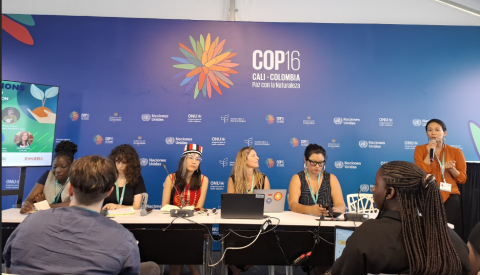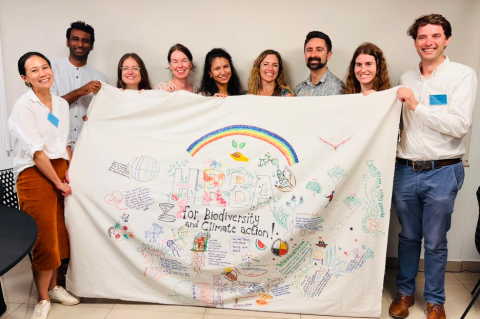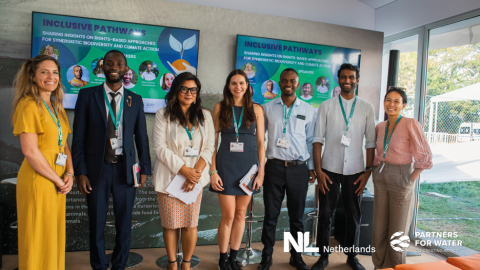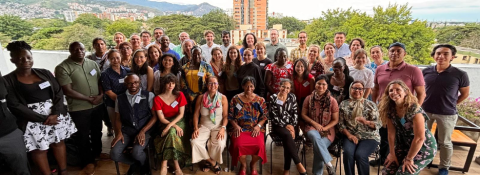Advancing equitable ecosystem-based adaptation work: Reflections from COP16
Advancing equitable ecosystem-based adaptation work: Reflections from COP16
At the heart of CDKN’s knowledge brokering work is climate justice. This includes the recognition of the importance of including diverse actors and their associated knowledge and evidence in decision-making and climate action based on local, lived realities and experiences.
Thus, we celebrated the news of the historic win for Indigenous Peoples and Local Communities with the establishment of a new permanent Subsidiary Body, which means that Indigenous people and local communities can participate more fully and effectively in Convention on Biological Diversity activities. This includes support for being able to defend their rights, and bring their local and traditional knowledge into decision-making processes that directly affect them and the nature that they have always been custodians of. Additionally, the Convention on Biological Diversity now recognises people of African descent as critical contributors to the Convention, a first in its history and a milestone for inclusive representation.
Acknowledging the intertwined nature of biodiversity loss and climate change, COP16 adopted a decision to strengthen synergies between biodiversity and climate actions. These synergies are at the core of CDKN’s ecosystem-based adaptation work and were highlighted in a brief that was launched at COP16. The brief stemmed from work in the Friends of Ecosystem Based Adaptation (FEBA) working group that CDKN co-chairs with the Secretariat of the Convention on Biological Diversity.
Aligning biodiversity policies with climate initiatives can help maximise their joint impact, fostering integrated solutions for these interlinked global crises. Ensuring that these integrated solutions are grounded in approaches that promote inclusion, gender equity and social justice can result in multiple co-benefits for both people and nature towards the Kunming-Montreal Global Biodiversity Framework targets, but this requires adequate resourcing, including sufficient funding and strengthened capacities of all actors involved.
However, against this backdrop, we were concerned with the setbacks in human rights and gender equality language during negotiations. CDKN, together with BESNet, SwedBio, Soka Gakkai International and Focali ran a pre-COP16 multi-actor dialogue with representatives from the parties, Indigenous peoples, local communities, researchers, practitioners, women and youth groups which resulted in a consolidated, whole-of-society call to action process for advancing on human rights based approaches for biodiversity and climate action. The outcomes of the dialogue were shared during numerous side-events at COP16, including a press conference.


While contact sessions started off with many parties boosting rights-related language, as the days went on, COP16 saw a concerning removal of human rights and gender equality language, particularly around gender-responsive and human-rights based approaches, despite these both being specific considerations in Section C of the Kunming-Montreal Global Biodiversity Framework.
These shifts risk weakening progress on inclusivity in biodiversity policies and threaten to sideline the needs and priorities of women and other marginalised communities. Some progress was made for more inclusive dialogue through the establishment of the new permanent Subsidiary Body, which will enhance the engagement and participation of Indigenous peoples and local communities in all convention processes. However, the lack of dedicated funding to support inclusion limits the potential impact on gender equality within biodiversity actions.
Although COP16 reaffirmed the need for significant resource mobilisation, and a new financial mechanism (the ‘Cali Fund’) was established for Digital Sequence Information (DSI) to address the longstanding issue of fair benefit-sharing, no final decisions were made on core financial mechanisms. Contributions to the Global Biodiversity Framework Fund (GBFF) currently total $163 million—far below the annual $30 billion needed by 2030, fulfilling just 0.5% of the target.
This funding shortfall poses a serious risk to biodiversity, and associated climate goals and efforts to facilitate more direct funding to local actors, including those who are marginalised, whose participation is crucial for on-the-ground success.

Looking ahead to COP29 in Azerbaijan, where the focus is on climate finance, the outcomes of COP16 set a challenging precedent for upcoming discussions on the New Collective Quantified Goal (NCQG). With thriving biodiversity recognised as essential for a stable climate, the disconnect in financing between biodiversity and climate efforts must be bridged.
Achieving effective, cross-cutting support will be critical to advance both biodiversity and climate goals in a coherent, mutually reinforcing way. While in Cali for COP16, CDKN took part in the 7th Global Landscape Forum Investment Case Symposium to explore what these options could look like, including charting a roadmap to financing the Kunming-Montreal Global Biodiversity Framework.
To keep synergistic and inclusive momentum going in the year of all 3 Rio Convention COPs, CDKN and their partners have a number of events planned associated with the Resilience Hub to advance on these important issues.


